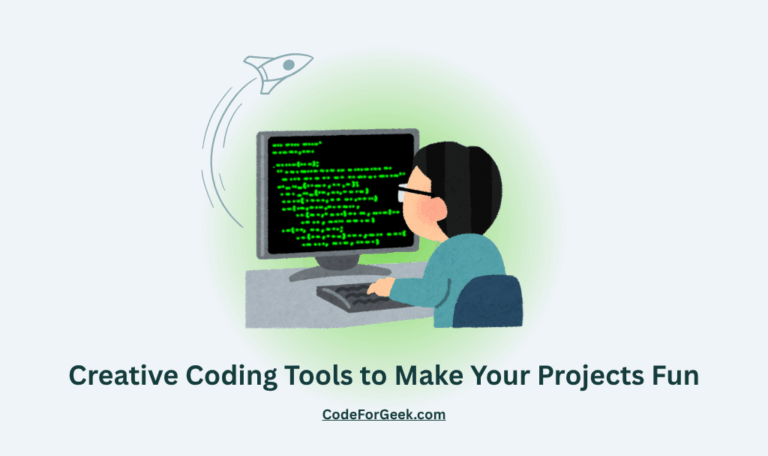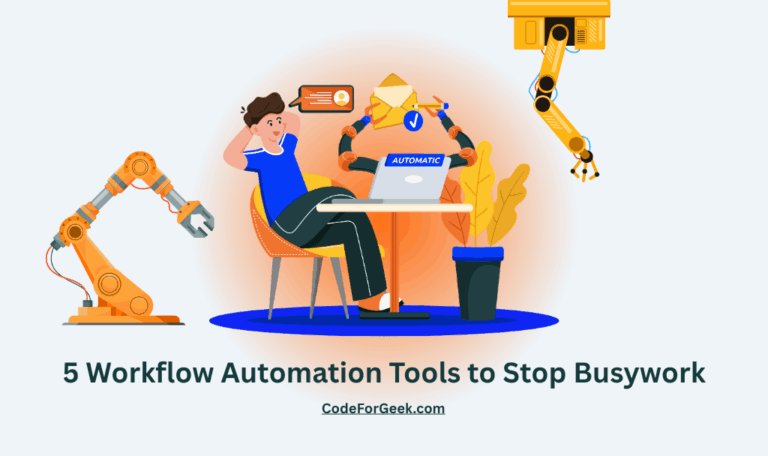New to Rust? Grab our free Rust for Beginners eBook Get it free →
10 Best Aisera Alternatives of 2026
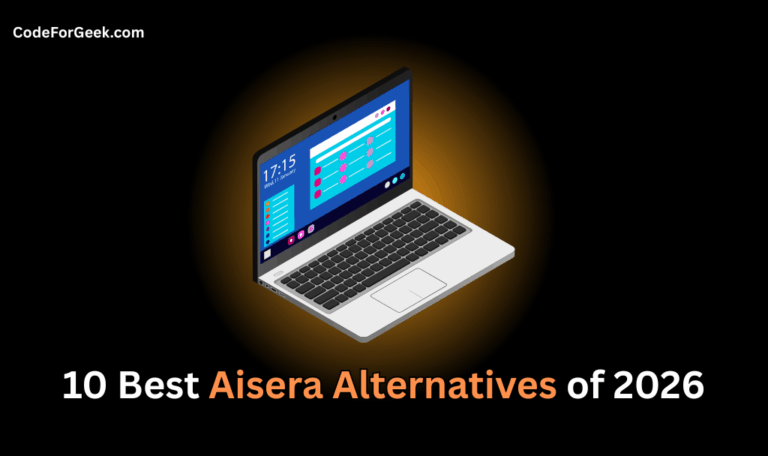
I have used Aisera back in past, and I appreciate what it does right. It’s an AI-powered service desk that automates repetitive work across IT, HR, and customer support. You can set it up to reset passwords, route tickets, answer FAQs, or even execute full workflows, all with minimal human effort. It’s like having a digital team that never sleeps.
But here’s the thing: Aisera’s power comes with trade-offs. It’s expensive, setup can take time, and it sometimes feels heavier than what smaller or mid-sized teams really need. If your goal is to automate fast, stay flexible, and still maintain enterprise-grade control, there are smarter alternatives out there that get you 80% of Aisera’s benefits at 50% of the cost and effort.
So, I have rounded up the best Aisera alternatives in 2026, tools that handle automation, AI chat, and service workflows without the overhead.
Top Aisera Alternatives for Customer Support
1. Boost.ai
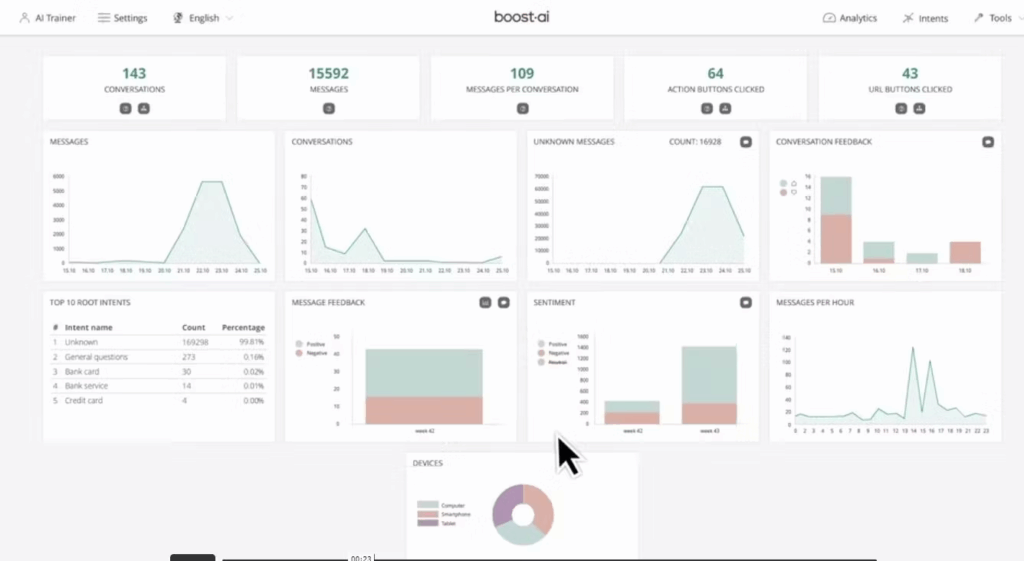
Boost.ai matches Aisera’s enterprise automation power but with more transparency and control. Its hybrid AI combines rule-based reliability with generative flexibility for customer and employee support.
Key Features:
- Hybrid AI: Combines rules with NLU and large language models for precise control.
- No-Code Builder: Slack-style interface for training intents and flows.
- Self-Learning AI: Improves continuously from agent interactions.
- Omnichannel Support: 35+ channels and 100+ languages supported.
- Compliance: ISO27001, GDPR, SSO, and on-premise options.
- Agent Assist: Suggests replies and context for human agents in real time.
Pros:
- High Accuracy: Delivers reliable responses in regulated industries.
- User-Friendly: Simple interface for non-technical staff.
- Fast ROI: Pre-trained content helps bots go live quickly.
- Scalable: Handles thousands of simultaneous conversations.
- Enterprise Focus: Strong support and co-creation with clients.
Cons:
- Premium Cost: Aimed at large enterprises with bigger budgets.
- Interface Gaps: Admin tools for large intent sets can feel clunky.
- Language Coverage Limits: Some niche languages require extra work.
- Mobile UI Issues: Minor glitches reported on certain iOS apps.
Pricing:
| Plan | Price | Core Features |
|---|---|---|
| Custom | Quote-based | Hybrid AI, no-code builder, compliance features, omnichannel support, etc. |
Best For:
Enterprises that need scalable, compliant AI agents with tight control over automation and responses.
2. Cognigy
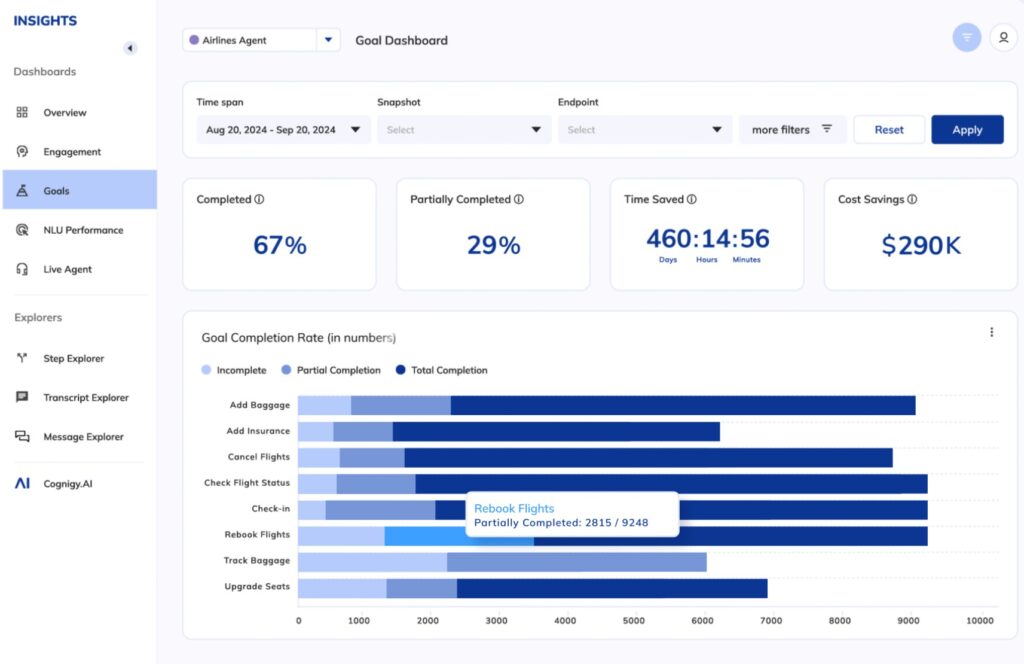
Cognigy focuses on voice + chat orchestration for large organisations. It offers advanced workflow design, analytics, and integration depth while staying low-code.
Key Features:
- Low-Code Builder: Visual editor to design conversation flows without coding.
- Omnichannel Support: Works on chat apps, web, voice, and messaging platforms.
- Advanced NLU: Detects intents in 100+ languages with high accuracy.
- Enterprise Integrations: Connects to CRM, ERP, IT systems, and APIs.
- Human Handoff: Seamless transfer to agents with full context.
- Analytics: Dashboards to track performance, drop-offs, and sentiment.
Pros:
- Highly Flexible: Can build anything from simple FAQs to complex workflows.
- Enterprise-Grade: Scales for high-volume global organisations.
- Voice Support: Strong speech recognition and text-to-speech features.
- Multi-Language: Supports localisation for international use.
- Compliance Ready: ISO, SOC 2, HIPAA, and GDPR certifications.
Cons:
- High Pricing: Enterprise-level cost, not suitable for small businesses.
- Learning Curve: Requires technical skill for advanced use.
- Resource Intensive: Full deployment needs planning and team effort.
- Limited Community: Smaller knowledge base compared to bigger vendors.
Pricing:
| Plan | Price | Core Features |
|---|---|---|
| Custom | Quote-based | Low-code builder, omnichannel support, enterprise integrations, analytics, etc. |
Best For:
Global enterprises needing robust contact-centre automation with deep backend integrations.
3. Avaamo
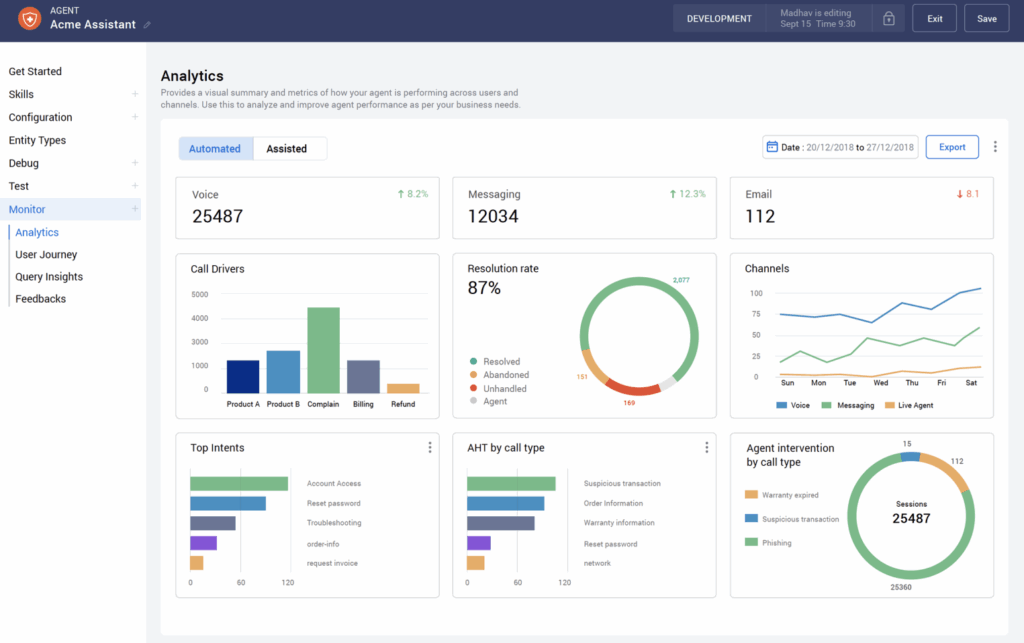
Avaamo brings vertical intelligence to the table — purpose-built for regulated industries. Its pretrained models handle domain-specific workflows and compliance out-of-the-box.
Key Features:
- Vertical AI Models: Pre-trained for finance, healthcare, insurance, and HR.
- No-Code Builder: Visual designer to create workflows without coding.
- Multilingual Support: 100+ languages and dialects for global deployments.
- Voice + Chat: Works across SMS, IVR, mobile, and web channels.
- Enterprise Integrations: 1,000+ connectors for CRM, ERP, ITSM, and more.
- Security & Compliance: SOC2, HIPAA, and GDPR ready with role-based access.
Pros:
- Industry-Specific Expertise: Comes ready with models for regulated sectors.
- Strong Automation: Handles complex queries with high accuracy.
- Flexible Deployment: Cloud or on-premise options.
- Comprehensive Analytics: Tracks containment, CSAT, and intent failures.
- Scalable: Supports large enterprises with high volumes.
Cons:
- Premium Pricing: Aimed at large enterprises only.
- Complex Setup: Deep integrations require technical expertise.
- Steep Learning Curve: Non-technical teams may need support.
- Cross-Channel Context: Conversations do not always carry over seamlessly.
Pricing:
| Plan | Price | Core Features |
|---|---|---|
| Custom | Quote-based | Enterprise deployment, vertical AI models, omnichannel support, etc. |
Best For:
Banks, insurers, and healthcare enterprises requiring secure, domain-specific conversational AI.
4. DeepConverse
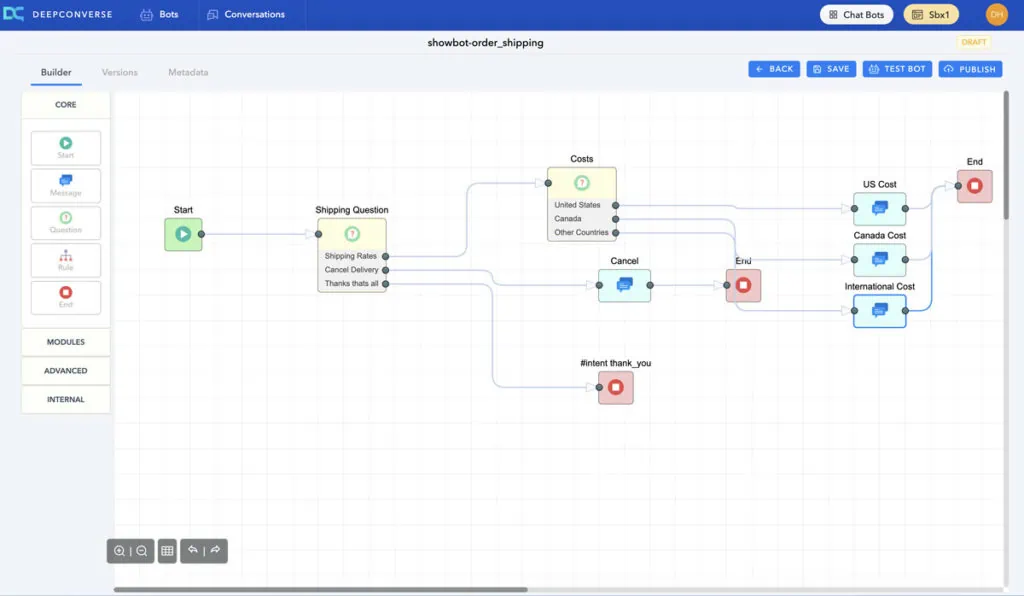
DeepConverse integrates directly with helpdesk systems like Zendesk and Salesforce. It automates repetitive Tier-1 queries using no-code flows and generative knowledge search.
Key Features:
- Helpdesk Integration: Connects natively with Zendesk and Salesforce for tickets and knowledge articles.
- Generative Answer Engine: Pulls accurate answers directly from FAQs and manuals.
- Interactive Guides: Step-by-step workflows for troubleshooting and Tier 1 automation.
- No-Code Builder: Drag-and-drop interface to design chatbot flows without coding.
- Analytics: Tracks deflection rates, resolution quality, and satisfaction scores.
Pros:
- Plug-and-Play: Works seamlessly with existing helpdesk tools.
- Fast Deployment: Easy setup with templates and no-code builder.
- High Automation: Handles repetitive queries and reduces agent workload.
- Multi-Channel Support: Works on web, mobile, and social platforms.
Cons:
- Zendesk-Centric: Best for Zendesk users; others may require more setup.
- Smaller Market Presence: Less recognition compared to larger vendors.
- Mobile SDK Gaps: Limited standalone mobile SDK options.
Pricing:
| Plan | Price | Core Features |
|---|---|---|
| Base Plan | ~$52/month | Zendesk integration, knowledge base answers, templates, etc. |
| Custom | Quote-based | Advanced flows, analytics, integrations, etc. |
Best For:
Teams already using Zendesk or Salesforce that want an easy AI layer for ticket deflection.
5. CoRover.ai
CoRover.ai supports chat, voice, and video bots and shines in multilingual markets. Its BharatGPT engine provides contextual AI for regional deployments.
Key Features:
- Omni-Channel Assistants: Chat, voice, and video bots on web, apps, WhatsApp, IVR, and more.
- Multi-Language NLP: Supports 100+ global languages and 13+ Indian languages.
- BharatGPT: Generative AI tuned for regional accuracy and contextual responses.
- Fast Deployment: Chatbot-as-a-Service model enables quick rollout.
- Enterprise Integrations: Pre-built connectors for CRM, ERP, banking, and ticketing.
- Security & Compliance: ISO 27001, GDPR, and HIPAA-ready with encryption and audit logs.
Pros:
- Proven at Scale: Handles billions of interactions in government and enterprise use.
- Strong Language Coverage: Ideal for multilingual deployments in Asia.
- Fast Implementation: Up to 10x quicker deployment with CaaS model.
- High ROI: Deflects repetitive queries and reduces operational costs.
- Versatile Use Cases: Customer support, HR, grievance handling, and lead generation.
Cons:
- Enterprise-Level Pricing: Costs are not public and aimed at large organisations.
- Limited Global Reach: Strong in Asia but less presence in Western markets.
- Newer LLM Offering: BharatGPT adoption outside Asia is still limited.
Pricing:
| Plan | Price | Core Features |
|---|---|---|
| Custom | Quote-based | Multilingual bots, omni-channel support, enterprise integrations, security, etc. |
Best For:
Governments and large enterprises needing multilingual, multimodal automation across wide audiences.
6. Zendesk
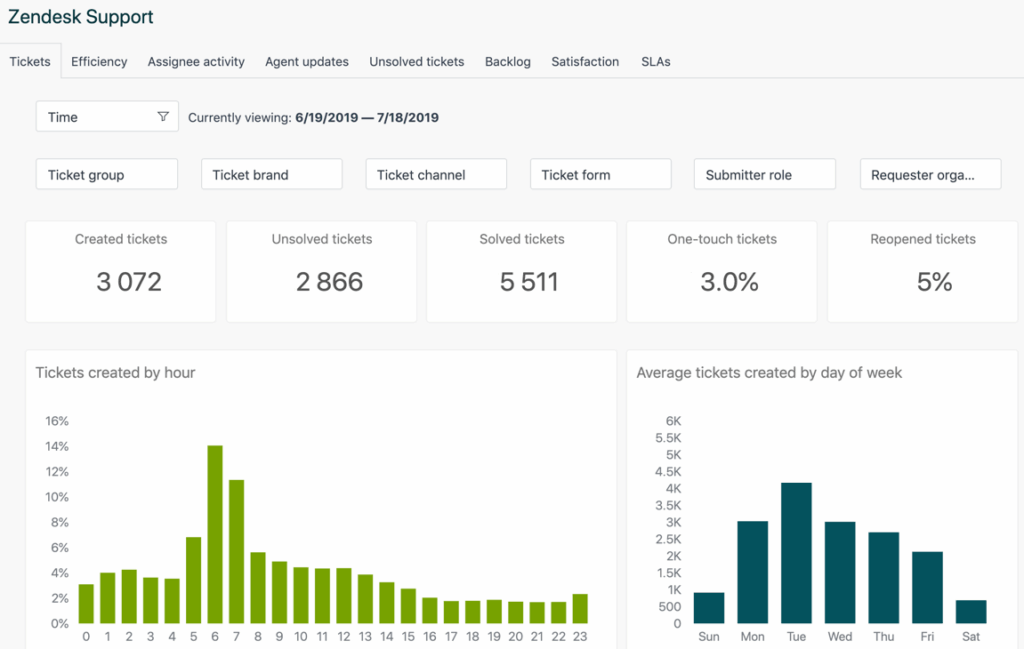
Zendesk offers a secure, omnichannel backbone for enterprise support. It’s the layer Aisera often sits on top of — powerful ticketing, analytics, and integration ecosystem.
Key Features:
- Omnichannel Ticketing: Centralises email, chat, phone, and social into one ticketing hub.
- AI and Automation: Bots, routing, and workflows to cut manual effort.
- Integrated Voice: Built-in call centre with IVR, call recording, and voicemail.
- Analytics & Reports: Dashboards and custom metrics for SLA, CSAT, and team performance.
- Marketplace: 1,000+ integrations with CRMs, ecommerce, and productivity apps.
Pros:
- Comprehensive Suite: Covers tickets, chat, phone, and self-service.
- Automation Strength: Improves productivity and resolution speed.
- Advanced Analytics: Tracks KPIs and service quality effectively.
- Flexible Setup: Wide configuration and integration options.
Cons:
- High Pricing: Advanced features require costly tiers.
- Steep Learning Curve: Complex UI needs proper training.
- Developer Dependence: Customisation often requires technical support.
- No Free Plan: Only a limited trial is available.
Pricing:
| Plan | Price (per agent/month) | Core Features |
|---|---|---|
| Support Team | $19 | Email, ticketing, Facebook/X support, analytics dashboards, etc. |
| Suite Team | $55 | AI agents, generative replies, knowledge base, chat, social messaging, etc. |
| Suite Professional | $115 | Multiple help centres, advanced reporting, CSAT surveys, SLA management, IVR, etc. |
| Suite Enterprise | $169 | 300 help centres, sandbox, custom roles, audit logs, advanced security, etc. |
Best For:
Large organisations wanting a scalable, auditable support core with optional AI integrations.
7. Intercom
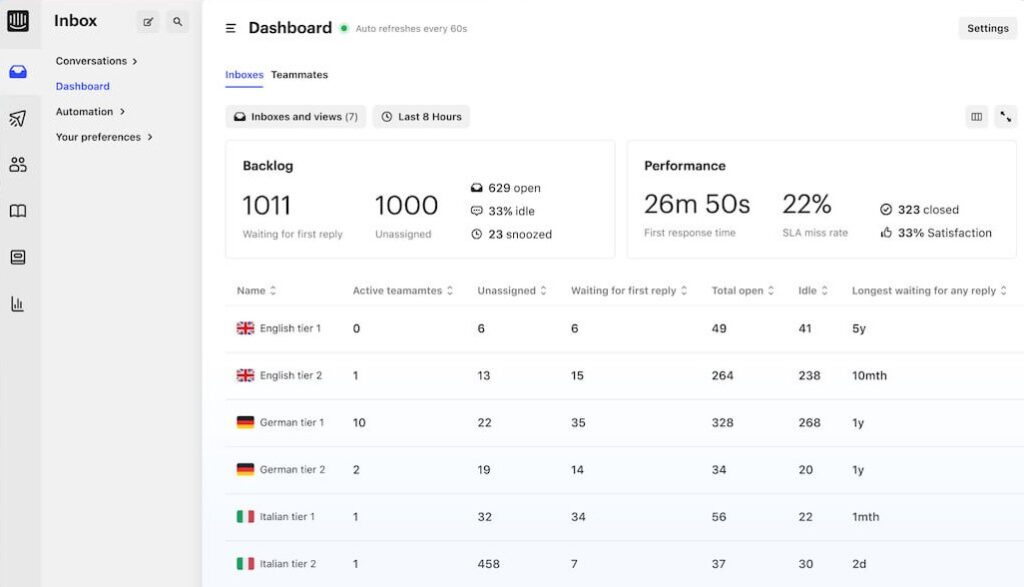
Intercom focuses on conversational engagement rather than heavy service workflows. With its Fin AI agent and proactive messaging, it’s great for product-led and SaaS businesses.
Key Features:
- Messenger: In-app and web chat widget with user data and context.
- Fin AI Agent: GPT-4 powered bot that answers FAQs from your knowledge base.
- Outbound Campaigns: Targeted messages for onboarding and updates.
- Shared Inbox: Unified email and chat inbox with assignments.
- Knowledge Base: Help centre and product tours to reduce ticket load.
Pros:
- Real-Time Engagement: Excellent in-app chat experience.
- Personalisation: Segments and targets messages by user data.
- Unified Platform: Handles both support and customer outreach.
- Clean Interface: Easy for teams to learn and use daily.
- Strong Ecosystem: Integrates with CRMs and analytics tools.
Cons:
- High Pricing: Per-seat costs and usage fees rise quickly.
- Unpredictable Billing: AI resolution charges can spike costs.
- Limited for Small Teams: Overkill for startups or small businesses.
- Marketing Gaps: Advanced marketing features require third-party tools.
Pricing:
| Plan | Price (per seat/month) | Core Features |
|---|---|---|
| Essential | $29 | Messenger, Fin AI Agent, shared inbox, help centre, reports, etc. |
| Advanced | $85 | All Essential + workflows, multiple inboxes, private/multilingual help centre, etc. |
| Expert | $132 | All Advanced + SSO, HIPAA, SLAs, multibrand support, etc. |
Best For:
SaaS and digital-first companies that need AI support embedded directly into their products.
8. Freshworks
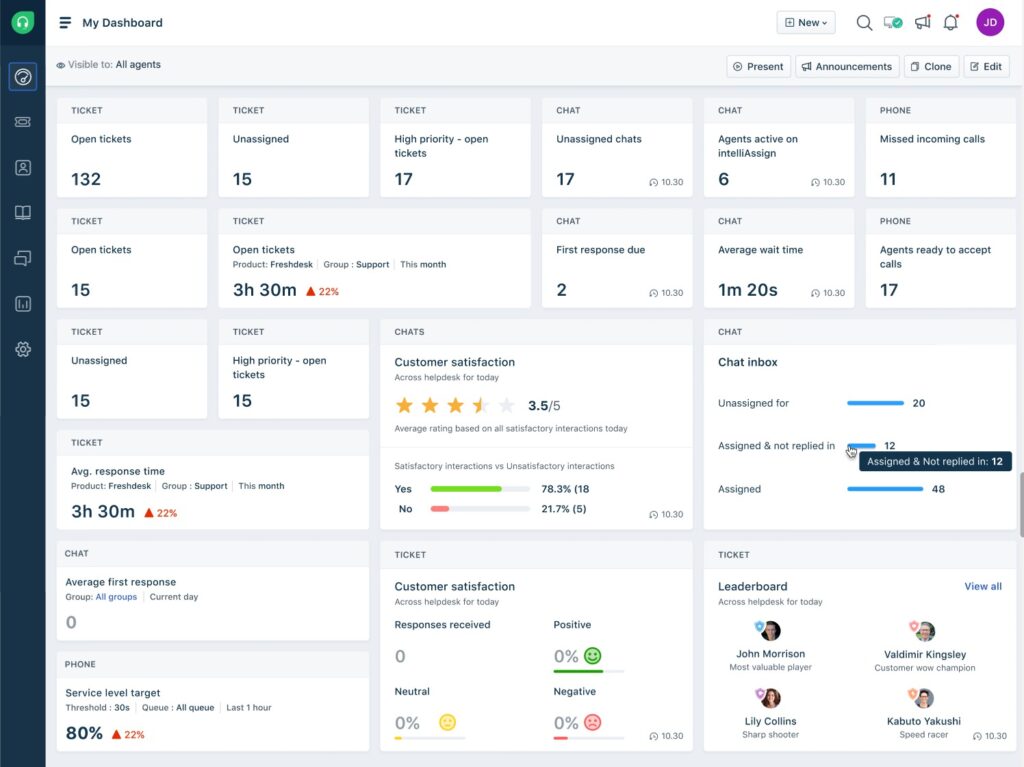
Freshworks provides affordable, all-in-one support with AI assistance (Freddy AI). It’s easy to deploy and integrates chat, ticketing, and CRM.
Key Features:
- Omnichannel Inbox: Collects email, chat, and social messages into one place.
- Freddy AI: Suggests replies, automates workflows, and powers chatbots.
- Knowledge Base: Customisable help centre with FAQ suggestions.
- Collaboration Tools: Internal notes and automated rules to manage tickets.
- Unified View: CRM-lite profiles showing history, sentiment, and CSAT.
Pros:
- Easy Setup: Teams can go live in days without heavy onboarding.
- Affordable Pricing: Free plan and low-cost tiers for startups.
- Friendly UI: Clean dashboard that is simple for agents to navigate.
- All-in-One Option: Freshdesk, Freshchat, and Freshcaller work together smoothly.
Cons:
- Limited Customisation: Less flexible for complex enterprise workflows.
- Multiple Modules: Using different Freshworks products can feel fragmented.
- Performance Lags: Small slowdowns during heavy use.
Pricing:
| Plan | Price (per agent/month) | Core Features |
|---|---|---|
| Growth | $15 | Ticketing, inbox, tasks, customer portal, etc. |
| Pro | $49 | Multilingual support, custom objects, advanced reporting, etc. |
| Pro + AI | $78 | All Pro + Freddy AI Copilot and AI Insights, etc. |
| Enterprise | $79 | Advanced security, audit logs, workflows, etc. |
Best For:
Startups and SMBs seeking quick setup and budget-friendly automation across channels.
9. LiveChat
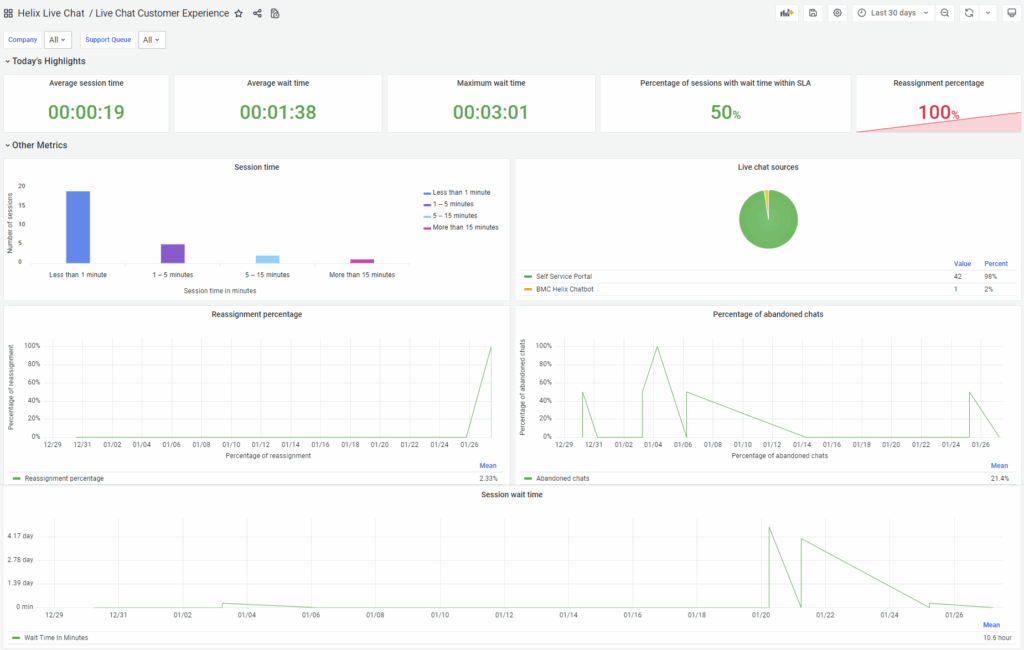
LiveChat delivers real-time human chat for web and mobile. It’s not a full helpdesk replacement but excels at fast customer interactions.
Key Features:
- Real-Time Chat: Smooth widget with typing preview and user context.
- Agent Productivity Tools: Canned responses, chat routing, and multi-chat handling.
- Customisable Widget: Brand colours, logos, and triggers for proactive chats.
- Chatbot Integration: Bots to handle FAQs before escalating to agents.
- Analytics: Post-chat surveys and dashboards to track agent performance.
Pros:
- Excellent Chat UX: Optimised for real-time conversations.
- Quick Setup: Easy script or plugin installation for websites.
- Conversion Triggers: Smart greetings like “Need help?” at checkout.
- Flexible Branding: Fully customisable chat design.
Cons:
- Not a Full Helpdesk: Limited tools for complex ticket workflows.
- Costs Rise With Agents: Pricing can grow quickly per seat.
- Bot Add-On: AI chatbot is a separate service.
- Lower Plans Limited: Entry tiers restrict features and history.
Pricing:
| Plan | Price (per person/month) | Core Features |
|---|---|---|
| Starter | $19 | Basic chat widget, text intelligence, 60-day history, etc. |
| Team | $49 | Unlimited chat history, customisation, reporting, etc. |
| Business | $79 | Advanced reporting, staffing prediction, SMS support, etc. |
| Enterprise | Custom | White-label, SSO, HIPAA compliance, dedicated manager, etc. |
Best For:
E-commerce and B2B teams that prioritise speed and personal chat experience.
10. LiveChatAI
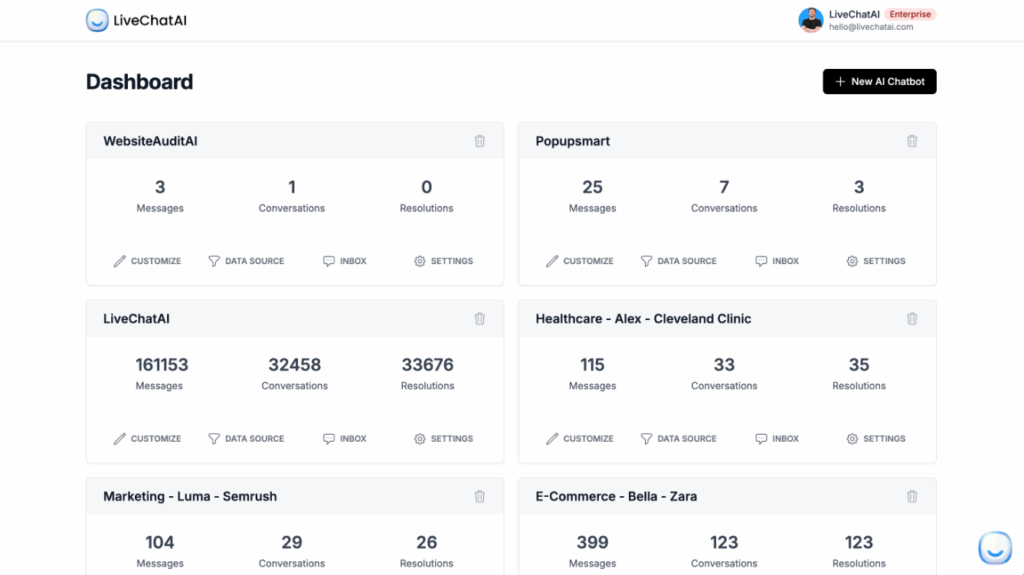
LiveChatAI combines AI automation with human fallback, offering always-on coverage without enterprise overhead.
Key Features:
- Dual Response: AI resolves FAQs and passes complex queries to humans.
- Seamless Handoff: Transfers to your team via Intercom, WhatsApp, SMS, or email.
- Knowledge Training: Learns from FAQs, documents, and website content.
- Multi-Channel Deployment: Works on websites, WhatsApp, Shopify, Slack, and WordPress.
- AI Actions & API: Can reset passwords, check orders, or book appointments.
- Analytics: Monitors resolution rates, response times, and satisfaction.
Pros:
- Balanced Support: Automation plus human backup keeps quality high.
- Cost Savings: Reduces repetitive queries so agents focus on complex cases.
- User Experience: Smooth transition between AI and human agents.
- Channel Reach: Covers web chat and popular messaging apps.
- Quick Setup: Templates and knowledge uploads make deployment faster.
Cons:
- Outsourced Handoff: Using external agents may raise quality or privacy concerns.
- Pricing Complexity: Costs vary by usage and added services.
- Integration Effort: Requires setup for CRM or workflow connections.
- Smaller Ecosystem: Newer platform with fewer third-party references.
Pricing:
| Plan | Price | Core Features |
|---|---|---|
| Free | Free | 250 messages, 1 chatbot, live chat, basic analytics, etc. |
| Basic | $390 | 4,000 messages, 1 chatbot, live chat, contacts, etc. |
| Pro | $890 | 10,000 messages, 2 chatbots, AI actions, API access, etc. |
| Advanced | $1,890 | 15,000 messages, 5 chatbots, WhatsApp integration, advanced models, etc. |
| Expert | $3,890 | 20,000 messages, 10 chatbots, more seats, advanced analytics, remove branding, etc. |
Best For:
Companies needing continuous AI chat coverage with minimal setup effort.
Aisera Alternatives Comparison Table
| Tool | Best For | Key Strength | Compliance & Scale | Pricing Starts At |
|---|---|---|---|---|
| Boost.ai | Enterprise automation | Hybrid AI + rule-based control | ISO 27001, GDPR | Custom |
| Cognigy | Voice + chat orchestration | Low-code automation, deep integrations | SOC 2, HIPAA, GDPR | Custom |
| Avaamo | Regulated industries | Vertical AI + domain models | SOC 2, HIPAA, GDPR | Custom |
| DeepConverse | Helpdesk users (Zendesk / Salesforce) | Plug-and-play ticket deflection | GDPR, SOC 2 | ~$52 / mo |
| CoRover.ai | Governments & multilingual orgs | Chat + voice + video bots (BharatGPT) | ISO 27001, GDPR, HIPAA | Custom |
| Zendesk | Omnichannel backbone | Ticketing + analytics + integrations | SOC 2, GDPR compliant | $115 / agent / mo |
| Intercom | SaaS & digital-first | Fin AI agent + in-app messenger | GDPR ready | $29 / seat / mo |
| Freshworks | Startups & SMBs | All-in-one + Freddy AI | ISO 27001, GDPR | Free / $15 / agent / mo |
| LiveChat | Real-time support | Human chat + conversion triggers | GDPR ready | $19 / agent / mo |
| LiveChatAI | AI + human hybrid teams | 24/7 automation + handoff | Cloud security, encryption | Free / $39 / mo |
Conclusion
Aisera is a strong choice for enterprises seeking unified automation across departments but it’s not the only game in town.
- If you want more control, go with Boost.ai.
- If your goal is voice + workflow depth, choose Cognigy.
- Avaamo leads in regulated sectors, while DeepConverse offers fast helpdesk automation.
- Need multilingual scale? CoRover.ai wins there.
- And for lighter teams, Intercom, Freshworks, and LiveChatAI provide leaner, faster options.
Ultimately, your best alternative depends on whether you value depth, compliance, or simplicity but every option here outperforms Aisera in at least one of those dimensions.

